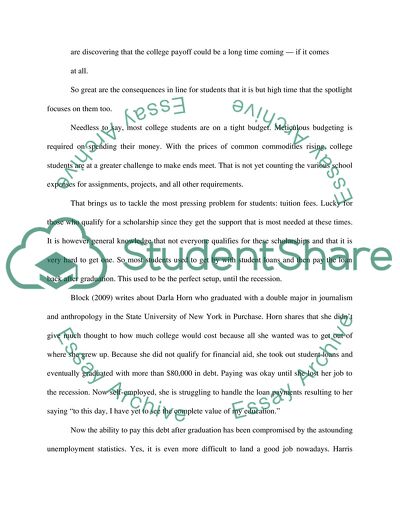
- Home
- Free Samples
- Premium Essays
- Editing Services
- Extra Tools
- Essay Writing Help
- About Us
- Studentshare
- Subjects
- Miscellaneous
- Research Papers: What is the impact of recession to my life as a college student
Research Papers: What is the impact of recession to my life as a college student - Essay Example
The debate as to what…

- Subject: Miscellaneous
- Type: Essay
- Level: Ph.D.
- Pages: 4 (1000 words)
- Downloads: 0
- Author: keyshawn72
Extract of sample "Research Papers: What is the impact of recession to my life as a college student"
When the recession of 2008 hit, everyone was taken by surprise. Industries suffered, people lost jobs; jobs were scarce, times were tough. A lot of attention naturally focused on how businesses were doing and the workforce that were clearly affected. Most, if not all, of both written and televised news about the impact of recession were addressed to businessmen or companies. There is however another sector of the society which was not given the much attention, information, and most of all the assurance that they deserved – college students.
Of all the people who got affected by the recession, none suffered as much as the students who went or are going through college in the hope of better futures. What used to be the promise of a ticket to a good job and successful future did not seem too promising anymore. Block (2009), USA Today writer, very eloquently expressed this fear: For years, an article of faith in this country has been that college is the gateway to a better life. So deeply held is this belief that many students… borrow tens of thousands of dollars to attend prestigious public or private universities.
But as the worst recession since World War II trudges into its 21st month, many graduates are discovering that the college payoff could be a long time coming — if it comes at all. Needless to say, most college students are on a tight budget. Meticulous budgeting is required on spending their money. With the prices of common commodities rising, college students are at a greater challenge to make ends meet. That is not yet counting the various school expenses for assignments, projects, and all other requirements.
That brings us to tackle the most pressing problem for students: tuition fees. Lucky for those who qualify for a scholarship since they get the support that is most needed at these times. It
...Download file to see next pages Read MoreCHECK THESE SAMPLES OF Research Papers: What is the impact of recession to my life as a college student
Impact of Financial Aid on Educational Environment
Data analyses & Findings
Marketing Strategy for the UK Universities
The Comparisons of Binge Drinking Among Underage College Students
Causes and Effects of Depression on College Students
The Recession and a Student
Initiatives for the Global Recession
Strategic Planning, Educational System of Argentina

- TERMS & CONDITIONS
- PRIVACY POLICY
- COOKIES POLICY